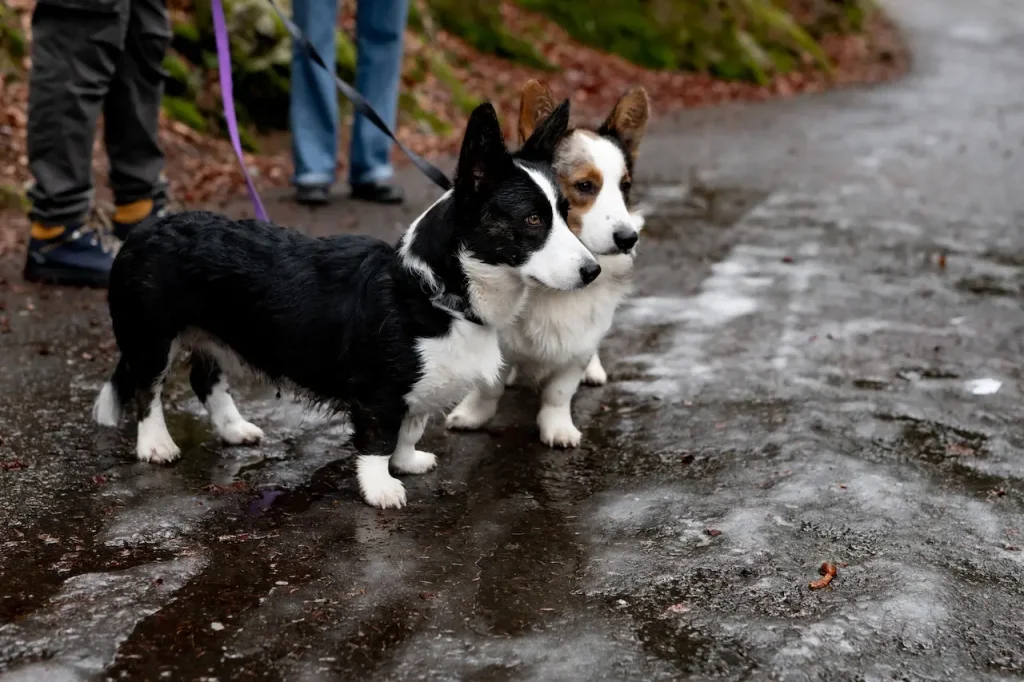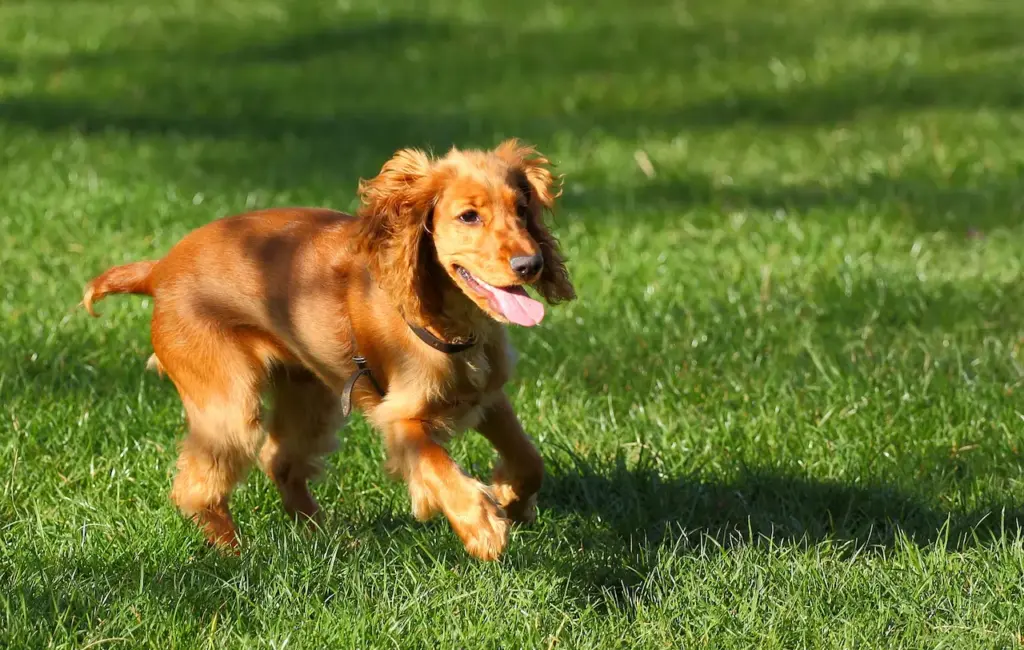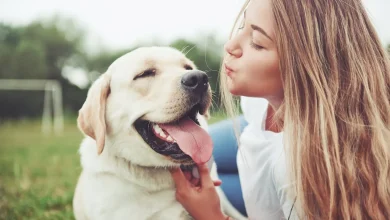Why Is My Dog Coughing
Why Is My Dog Coughing / Retching (Dry Heaving) And What To Do
Retching (also known as Dry Heaving) is a peristaltic motion of the stomach and esophagus in reverse without vomiting. Your dog is not actually vomiting when he retches. Retching can precede vomiting in some cases, but it may also cause only a small amount of mucus, or bile, to be spit out.
If your dog vomits a few times and doesn’t show any other symptoms, you shouldn’t be concerned. Retching can be a sign of a serious underlying condition in dogs. Dry heaving in dogs can be caused by a number of medical conditions. Some of these conditions may even be life-threatening without early treatment.
You should take your dog to a veterinarian immediately if they are retching. This article will discuss several reasons for your dog to be retching, and how to solve the issue.

What is normal vomiting in dogs?
Vomiting is a common occurrence but it can be an indication of a more serious problem. If vomiting or retching persists, it is important to consult a veterinarian.
While it may be alarming to pet owners, vomiting is part of the digestive process for dogs. Dogs can vomit due to a number of factors, such as eating too fast, consuming food that is not suitable for their stomach or stress.
Vomiting is a common occurrence. However, it can be a sign that something more serious is going on. Chronic vomiting can, for instance, be a sign of gastrointestinal disease or other health issues. If a dog has diarrhea, or is experiencing frequent vomiting, or other symptoms, such as lethargy or diarrhea, it’s important to consult a veterinarian to determine the cause.
You can help your dog avoid vomiting by taking certain steps. Smaller, more frequent meals can prevent stomach upset. Avoid giving your dog table scraps, or foods high in spices or fat.
Dehydration can worsen vomiting and cause other health problems. It is vital that a dog who is vomiting continues to drink water and stay hydrated.
Important Points
- Retching is another name for dry heaving, which occurs when a dog vomits without actually releasing any stomach contents.
- In dogs, dry heaving may be due to a number of causes, such as gastrointestinal issues, respiratory problems, heart worms or stress.
- Dry heaving may be an indication of a more severe condition such as a gastric torsion, or bloat. These conditions can be fatal for dogs. It is important to get veterinary help as soon as a dog seems to be dry heaving or in distress.
Why Your Dog is Retching
Medical and non-medical causes can cause dog dry heaving. These include:
Gastric Dilatation and Volvulus
The condition is caused by excessive gas in the stomach. This condition is mainly seen in dogs. Gastric torsion is another name for GDV. The stomach of a dog is stretched and twisted.
This condition is sometimes called “bloating”, but the stomach does not twist. Bloating is normal and occurs after eating. GDV can be fatal without medical treatment.
The dog’s stomach twists and expands, blocking its exit and entrance. This twisting and pressure also blocks blood flow to other vital organs.
GDV dogs dry-heave to release trapped gas. The gases are not released because the stomach entrance is blocked. Your dog will continue to retch. GDV can also be characterized by an increased heartbeat, labored breaths, and an inflamed abdominal area. GDV requires immediate surgery for dogs.
Blocked Throat
A foreign object could also be causing your dog to retch. It may have been lodged in the esophagus, or blocked airways. Your dogs may mistakenly swallow rocks, tissues, toys or other foreign objects. The dog may vomit, retch or even gag.
If you suspect that an object has become stuck in the throat of your dog, other signs to watch out for are pacing, mauling on the face, loud breath sounds, and salivation. Dry-heaving coughs are a sign that a dog is trying to clear obstructed airways. Your dog may eventually vomit the foreign body.
In some cases the object may be too deep and dry heaving is not effective. The object should be removed by a veterinarian. Attempting to remove it yourself could damage the esophageal layer of the dog.
Respiratory Disease
Different respiratory illnesses can cause dogs to violently cough, resulting in dog dry heaving. Kennel Cough is one of these diseases. Kennel Cough causes dogs to violently cough, which can cause them to dry heave. Canine infectious tracheobronchitis is another name for it.
The airborne disease kennel cough is caused by bacteria and viruses, particularly Bordetella. Any dog that is in the vicinity of a dog with this airborne illness can get it.
Dog parks and groomers are common places where kennel cough is contracted. In order to protect your dog from kennel-cough, you should inoculate him.
Tumors Obstructing The Airways
A tumor in the esophagus, or in the airways can also cause retching. A tumor that grows in the dog’s esophagus or airways can block it. It also compresses your dog’s esophagus.
This abnormal growth may cause breathing problems. Your dog may become irritated, which can cause him to dry heave or cough to expel the irritant.
These tumors are only removed surgically.

Gobbling
Some dogs do not chew their food properly or wait for the previous bolus of food to be swallowed. When dogs eat quickly, the food can end up in the wrong place. The food can get stuck in the dog’s airways and cause them to dry-heave.
Gastric Dilatation Volvulus can also affect dogs who eat rapidly. If you notice that your dog has dry heaving when eating, it is likely this. This can be resolved by purchasing a Slow Feeder which will ration your dog’s meals.
Nausea
Your dog can feel sick for many reasons. Your dog may vomit if he swallows something that upsets its stomach. Other normal daily activities, such as eating large quantities of food or gobbling up food can also make your dog feel nauseated.
As a side-effect, certain drugs may cause nausea in dogs, which could lead to dry heaving. In addition to nausea, other issues can arise from ingesting unsavory substances, including diarrhea, drooling and so on.
Bilious Vomit
Bile is the yellowish-green liquid produced by the liver. Bile is necessary for complete digestion. The stomach of a dog is empty during a prolonged period of fasting. It means that there is nothing to neutralize bile or gastric acid. This can cause nausea and retching.
Bilious vomiting is caused by an excessive accumulation of bile within the stomach. This causes irritation to the stomach walls. The dog will start to vomit a yellow fizzy liquid if he doesn’t begin eating. Pale gums, dehydration and drooling are other signs of bilious vomiting.
Loss of Elasticity in the Trachea
The trachea, a flexible respiratory tube that carries air to the lungs, is also known as the windpipe. The windpipe is the common name for it. The trachea has cartilaginous rings which make it flexible.
The cartilaginous rings of the trachea in some dog breeds such as Poodles weaken, reducing the diameter. The condition is hereditary. The trachea can become constricted and cause severe coughing or retching.
Tonsillitis
Tonsillitis occurs when the tonsils become inflamed. The tonsils swell due to this inflammation. This lymphatic organ can cause the dog to gag, and dry heave, when it swells.
How to cure Retching in Dogs
Visit the Veterinary Doctor
You can’t ignore retching. It needs immediate attention. Tell your veterinarian about all the signs you have observed. Tell your veterinarian if your dog has vomited or not since it began retching. Please let us know what your dog ate recently.
The vet will perform physical examinations in order to determine if there is anything that could help the diagnosis. Veterinarians also perform several chemical tests, such as urinalysis and blood. Your vet may be able pinpoint the cause of the retching using imaging techniques.
The vet will then perform the treatment that is appropriate for your dog based on its condition. The vet must perform surgery immediately on the dog in the event of Gastric Dilatation and Volvulus.
Kennel Cough
In this situation, the first thing you should do is isolate the dog infected because it is contagious. These dogs can be treated while they are in isolation with anti-inflammatory drugs and cough suppressants.
Bloating
Most often, bloating can be relieved by the dog belching or retching.
Windpipe Collapse Repair
There is no cure for a collapsed or swollen trachea. Anti-inflammatories and bronchodilators can be used to manage the condition. The dog’s weight can also aggravate the condition. Surgery is also effective, but it can be costly, and many vets don’t have the funds to perform this procedure.
How to Prevent Retching
Reduce the amount of food your dog eats to avoid bloating. You should feed your dog less food but more often. This can be done with food dispensers. GVD can also be prevented by a gastropexy, which prevents the stomach from twisting.
To prevent retching in dogs, they should be fed smaller portions of food multiple times a day.
You should also ensure that your dog is relaxed after each meal. It allows the food to settle without stress. Gastric torsion is mainly associated with dogs who engage in physical activities right after eating.
Inoculating the dog with Bordetella will prevent him from getting Kennel Cough. It would also be helpful if you avoided dog kennels with inadequate ventilation and were overcrowded.
Place your dogs under constant supervision to ensure that they do not swallow foreign objects or chew on inappropriate materials. Dog-proofing your home is the best way to stop your dog from consuming foreign objects.
A regular check-up is important for your dog. Your veterinarian can examine your dog to detect any upcoming health problems, such as throat tumours.
She retches in the mornings and vomits bile. Her appetite is excellent. What can I do to help?
Reflux Gastritis
When your dog, who is otherwise healthy, suddenly starts retching when he wakes up in the morning, it can be distressing. The mixture of mucus and yellowish bile that comes out looks like fluid. She bounces back after a recovery period that may last for an hour. She plays, eats, poops, and barks at the postman. Does her food make her sick? You may think of a thousand scenarios, most of which are distressing. A trip to the veterinarian may be necessary. You may be surprised to find out that the solution isn’t as bad and that it is simple. You may want to change the time of your dog’s meal.
When a dog’s stomach has been empty for too much time – i.e. after he or she has not eaten all night – it can cause bilious vomiting. This is why they vomit first thing in morning. This is because the contractions in the gastrointestinal system between meals are not working properly. The fluid from the duodenum can then move backwards and into the stomach, causing nausea. Although the cause of this sudden problem in dogs is not known, the solution is simple – adjust the timing and size of their meals.
You should feed your dog before going to bed, or in the evening. Also, you can do this in the morning. This will stop your dog from going without food for too long and hopefully solve the problem! If it doesn’t help, you should take your dog to the vet. The vet will perform a full workup to ensure that nothing else is wrong. You can also give your dog prescribed medication to reduce acidity in the stomach or help the contractions of its small intestine if this is not the case.
The conclusion of the article is:
It’s almost impossible to predict when your dog will be susceptible to a disease. There are still things you can to do improve your dog’s health. You should be aware of the environment in which your dog lives, teach him good eating habits and keep up with his medical checks.
Summary of 9 Reasons Why Your Dog is Retching and What To Do
Your vet can always diagnose and treat your pet.
| There are many reasons why your dog may be retching. | |
|---|---|
| 1 | Gastric Dilatation and Volvulus |
| 2 | Blocked Throat |
| 3 | Respiratory Disease |
| 4 | Tumors Obstructing The Airways |
| 5 | Gobbling |
| 6 | Nausea |
| 7 | Bilious Vomit |
| 8 | Tracheal Elasticity Loss |
| 9 | Tonsillitis |
| 10 | Reflux Gastritis |





